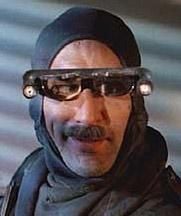Article summarized by AI below: The article argues that artificial intelligence (AI) is not a threat to humanity, but a powerful tool to solve global challenges such as climate change, poverty, disease, and inequality. It gives examples of how AI is already being used to improve health care, education, agriculture, and energy efficiency. It also discusses the ethical and social implications of AI, and how we can ensure that it is aligned with human values and goals. The article concludes that AI will save the world if we use it wisely and responsibly.
The article concludes that AI will save the world if we use it wisely and responsibly.
That’s a big if.
So… no
I even think AI is going to improve warfare, when it has to happen, by reducing wartime death rates dramatically. Every war is characterized by terrible decisions made under intense pressure and with sharply limited information by very limited human leaders. Now, military commanders and political leaders will have AI advisors that will help them make much better strategic and tactical decisions, minimizing risk, error, and unnecessary bloodshed.
first red flag - does this guy genuinely think that war is waged with the intent to minimize casualties? That almost seems unserious at face value, but I’ll keep reading
But the good news doesn’t stop there. We also get higher wages. This is because, at the level of the individual worker, the marketplace sets compensation as a function of the marginal productivity of the worker. A worker in a technology-infused business will be more productive than a worker in a traditional business. The employer will either pay that worker more money as he is now more productive, or another employer will, purely out of self interest. The result is that technology introduced into an industry generally not only increases the number of jobs in the industry but also raises wages.
And besides, why isn’t he arguing that AI will take your jobs? The compelling argument for AI here is that AI will take your job and that will be a good thing. That AI will do all of the tasks necessary to keep humans alive and thriving and you will still have to work is extremely dystopian. He justifies this with a quote fom Milton “I am favor of cutting taxes under any circumstances and for any excuse, for any reason, whenever it’s possible” Friedman.
Next up is his completely intellectually toothless argument that the owners of AI will not keep all of the profits from AI because factory owners didn’t keep the profits of their factories either???
As it happens, this was a central claim of Marxism, that the owners of the means of production – the bourgeoisie – inevitably steal all societal wealth from the people who do the actual work – the proletariat. This is another fallacy that simply will not die no matter how often it’s disproved by reality.
You don’t have to be a Marxist to look around and realize that owning the thing allows you to take as much of the money from it as you want to. Is he seriously claiming that being a CEO or a major shareholder doesn’t make you richer?
The flaw in this theory is that, as the owner of a piece of technology, it’s not in your own interest to keep it to yourself – in fact the opposite, it’s in your own interest to sell it to as many customers as possible. The largest market in the world for any product is the entire world, all 8 billion of us. And so in reality, every new technology – even ones that start by selling to the rarefied air of high-paying big companies or wealthy consumers – rapidly proliferates until it’s in the hands of the largest possible mass market, ultimately everyone on the planet.
[…]
In short, everyone gets the thing – as we saw in the past with not just cars but also electricity, radio, computers, the Internet, mobile phones, and search engines.
And he can’t identify that everyone gets a car but nobody gets a car factory? This seems glaring, especially with companies fighting so aggressively against the right to restore, clawing every last bit of ownership of the production and maintenance of products into their own hands. I don’t even need to source a link for this, we all know how DRM, copyright squatting, and monthly subscription fees disprove this notion - the owning class doesn’t want to sell you something, it wants to sell you access to it. Not only will AI be no different, but that’s literally how it already works right now.
This article all but dismisses the ethical and social implications of AI.
The climax reads: “The single greatest risk of AI is that China wins global AI dominance and we – the United States and the West – do not.”
Then it exhorts us to barrel ahead at full speed with zero concern for anything other than ‘beating’ China.
It’s so one-sided it’s actually kind of adorable.
Not that I entirely disagree with the case he’s putting forth, but it’s very telling that the examples he chose for things that people thought would destroy the earth, automobiles and electricity, are exactly the items that are fueling runaway global warming, and killing millions every year. Not to say we didn’t get great benefit out of it, but the fact that this obvious contradiction is lost on him means he probably has his blinders on a bit too tight:
Historically, every new technology that matters, from electric lighting to automobiles to radio to the Internet, has sparked a moral panic – a social contagion that convinces people the new technology is going to destroy the world, or society, or both.





